Cybersecurity jobs are booming in 2025, with over 750,000 unfilled positions in the U.S. alone. Certifications can help you break into this high-demand field, offering faster and more affordable alternatives to traditional degrees. Here are the top entry-level certifications to consider:
- CompTIA Security+: Broad coverage of core cybersecurity concepts. Cost: $404.
- Google Cybersecurity Certificate: Hands-on skills with Python, Linux, and AI. Cost varies.
- Certified Ethical Hacker (CEH): Focus on ethical hacking and penetration testing. Cost: $1,199.
- GIAC Information Security Fundamentals (GISF): Basics of risk management and incident response. Cost: $999.
- Cisco Certified CyberOps Associate: Prepares for Security Operations Center (SOC) roles. Cost: $300.
Quick Comparison
| Certification | Cost | Prerequisites | Focus Areas | Common Roles | Study Time |
|---|---|---|---|---|---|
| CompTIA Security+ | $404 | None | Core cybersecurity concepts | Systems Admin, Security Specialist | 2-4 months |
| Google Cybersecurity | Varies | None | Python, Linux, SQL, AI integration | SOC Analyst, IT Security Analyst | 3-6 months |
| Certified Ethical Hacker | $1,199 | 2+ years recommended | Penetration testing, ethical hacking | Pen Tester, Security Consultant | 3-5 months |
| GISF | $999 | None | Risk management, incident response basics | Compliance Specialist, Risk Analyst | 2-3 months |
| Cisco CyberOps Associate | $300 | None | SOC skills, network traffic analysis | SOC Analyst, Incident Response Analyst | 3-4 months |
Certifications like CompTIA Security+ and Cisco CyberOps Associate are cost-effective starting points, while CEH and GISF offer specialized career paths. Choose based on your goals, budget, and timeline to kickstart your cybersecurity career.
Top 5 Entry-Level Cybersecurity Certifications for Beginners in 2025!
What Are Entry-Level Cybersecurity Certifications
Entry-level cybersecurity certifications are designed for beginners, offering a starting point to develop essential knowledge and become familiar with the tools used in the field. Unlike advanced certifications, which often require prior experience, these credentials are accessible to those without extensive backgrounds. They're perfect for career changers, recent graduates, or anyone looking to transition into cybersecurity from another field.
Entry-Level Certification Requirements
Most entry-level certifications only require basic computer skills, though some suggest minimal experience. For example, CompTIA Security+ recommends about two years of IT experience, while ISC2's SSCP certification suggests one year. However, a cybersecurity degree can often fulfill the SSCP’s experience requirement, making it a practical option for recent graduates. These relatively low barriers make entry-level certifications an achievable step toward meeting rigorous industry standards.
Global Recognition Standards
The global recognition of these certifications adds to their value in the cybersecurity industry. Their credibility comes from factors like vendor neutrality, alignment with industry needs, and exam availability across different regions. These certifications are tailored to match U.S. and international job roles, providing employers with an objective measure of your technical skills while keeping you informed about the latest security trends and threats.
Organizations certainly see the value. Around 78% of companies prioritize certifications, with certified professionals earning 15–20% more than their non-certified counterparts. A Global Knowledge study also found that individuals holding certifications can earn up to 15% more.
Ken Dewey, director of the cybersecurity program at Rose State College, emphasizes how certifications can accelerate career opportunities:
"So they are hiring my students even before they finish their degree. As long as they have some of the classes and some background in it, they really don't need any hands-on experience. They do have to get a CompTIA Security Plus certification. Now that's a DOD [Department of Defense] requirement. But they are taking my students even before they finish."
Globally recognized certifications not only highlight your dedication to professional growth but also make you a stronger candidate for jobs and promotions. In industries like finance and healthcare, where strict regulations are the norm, having a recognized certification reassures employers that you can handle sensitive data and comply with regulatory standards. As cybersecurity continues to evolve, these certifications provide a solid starting point for building a successful career in the field.
Best Entry-Level Cybersecurity Certifications for 2025
The cybersecurity job market is thriving, with 161,000 open positions and a median salary of over $115,000 for professionals with 0–5 years of experience. Tech roles, in general, offer 130% higher median U.S. salaries than other industries, and cybersecurity jobs are growing at twice the national average job growth rate. Below, we break down some of the most relevant certifications to help you choose the right path for your cybersecurity career.
CompTIA Security+

CompTIA Security+ is a well-known starting point for anyone entering cybersecurity. This vendor-neutral certification covers key skills like threat management, network architecture, implementation, operations, and governance. With 265,992 professionals already certified in the United States and 63,260 job openings specifically seeking this credential, it’s a strong choice for career starters.
The exam costs $404 and has no prerequisites, making it accessible for recent graduates or those transitioning into cybersecurity. Its practical focus prepares you for roles such as systems administrator, network security specialist, or even junior penetration tester.
Chris Bramwell, Chief Privacy Officer for the State of Utah, highlights its importance:
"We knew as part of our maturity metrics and accountability, we wanted to show that we have staff that have the knowledge of cybersecurity and the Security+ certification itself provides that core knowledge we're looking for".
Phil Bates, CISO for the State of Utah, adds:
"Having a program like CompTIA is a repeatable process for us so if I've got to bring in new folks, having that base-level of talent you can go back to repeatedly and knowing you're going to get out of that is vital".
Google Cybersecurity Certificate
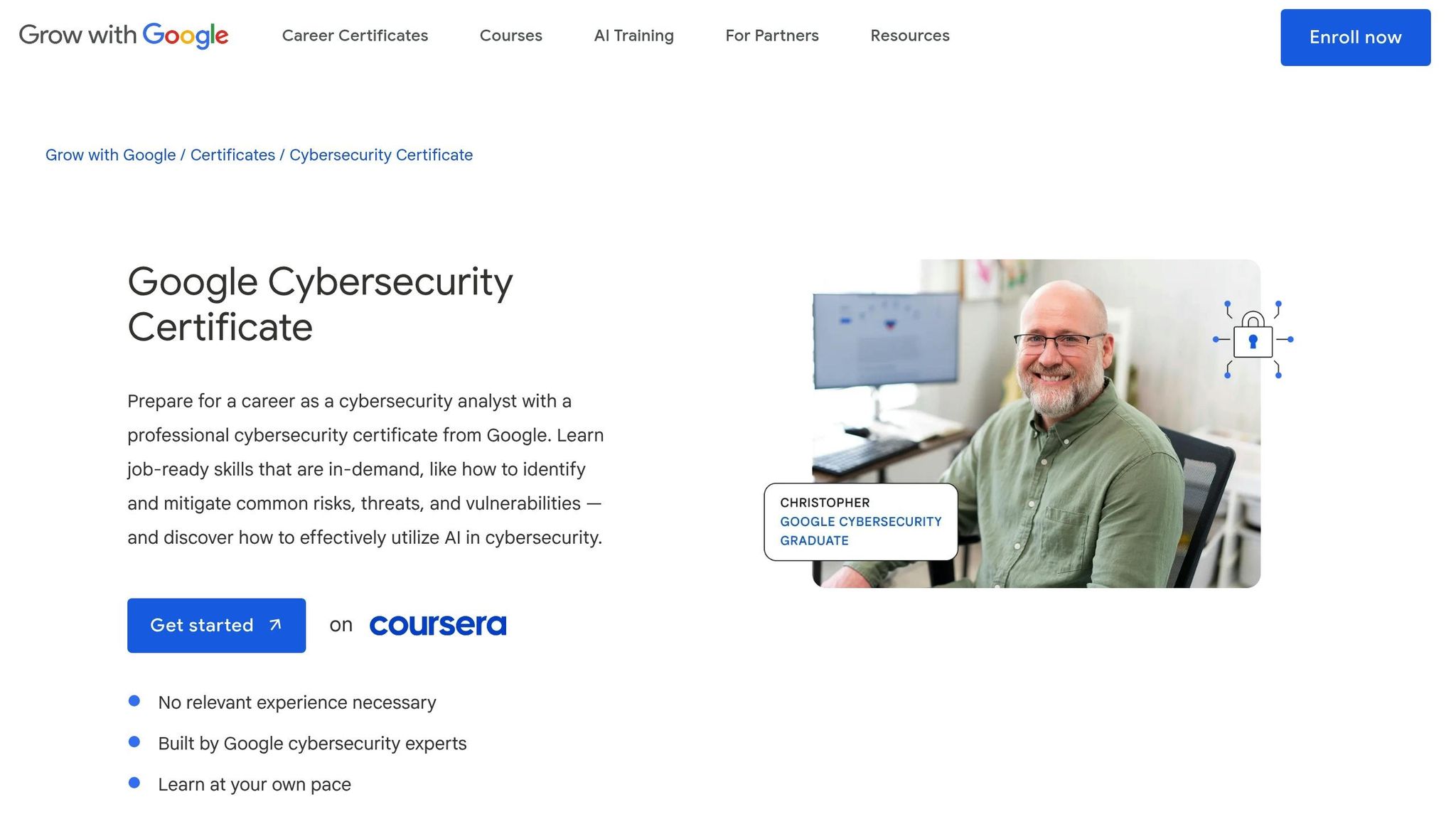
The Google Cybersecurity Certificate takes foundational skills a step further by incorporating modern tools like AI and cloud security. This program prepares you for roles such as cybersecurity analyst, SOC analyst, and IT security analyst, while also introducing essential AI training.
Key topics include Python programming, Linux systems, SQL databases, and SIEM tools - skills that are highly relevant in today’s cybersecurity landscape. Plus, this program is designed to help you prepare for the CompTIA Security+ exam, making it a great option for those looking to build a solid technical foundation.
Certified Ethical Hacker (CEH)
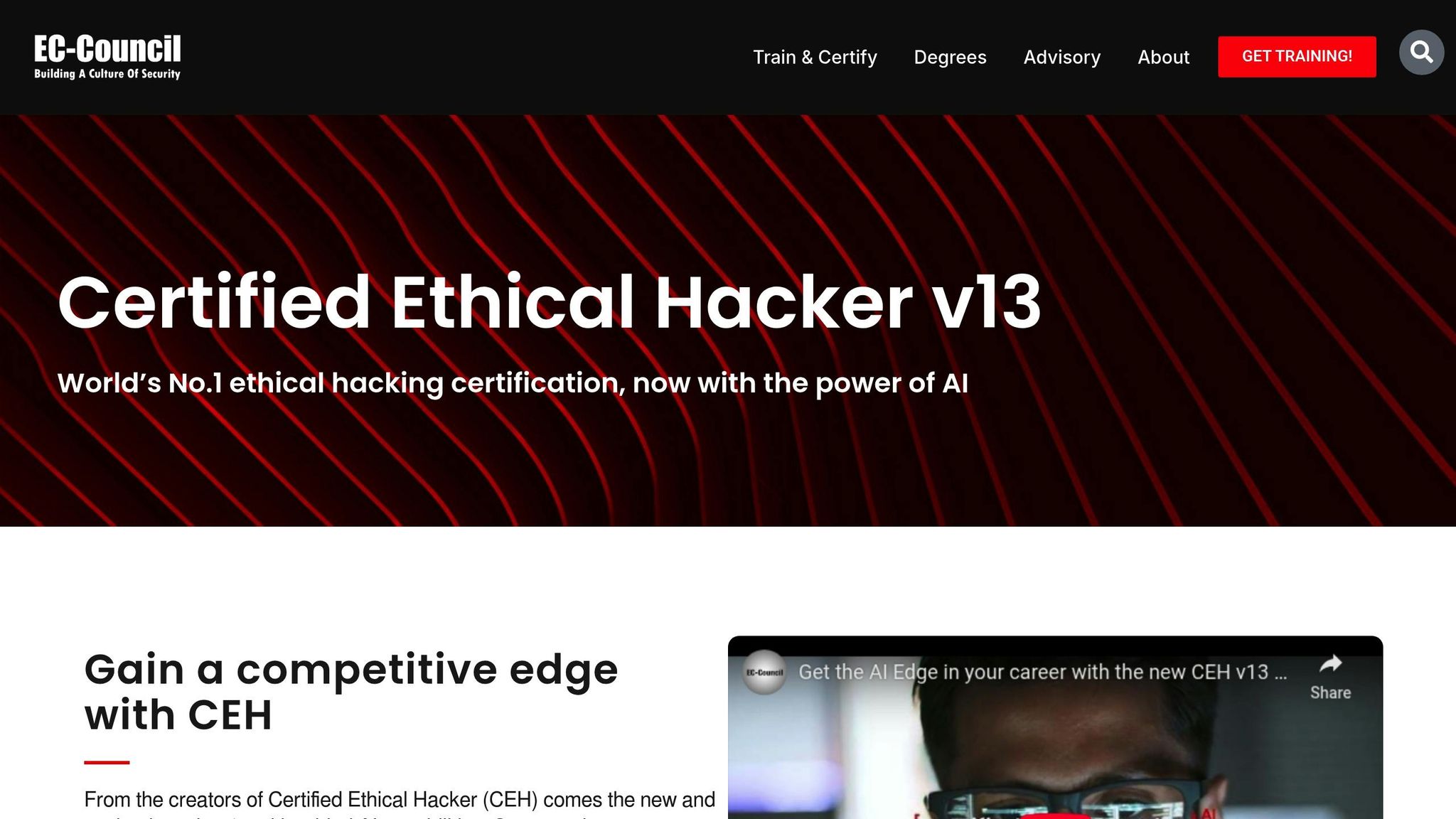
The Certified Ethical Hacker (CEH) certification is all about penetration testing and ethical hacking. It teaches you to think like a hacker while adhering to ethical standards. Topics include vulnerability assessments, penetration testing methodologies, and identifying weaknesses in systems. For those aiming to become penetration testers, CEH provides the specialized knowledge needed to excel in this niche.
GIAC Information Security Fundamentals (GISF)
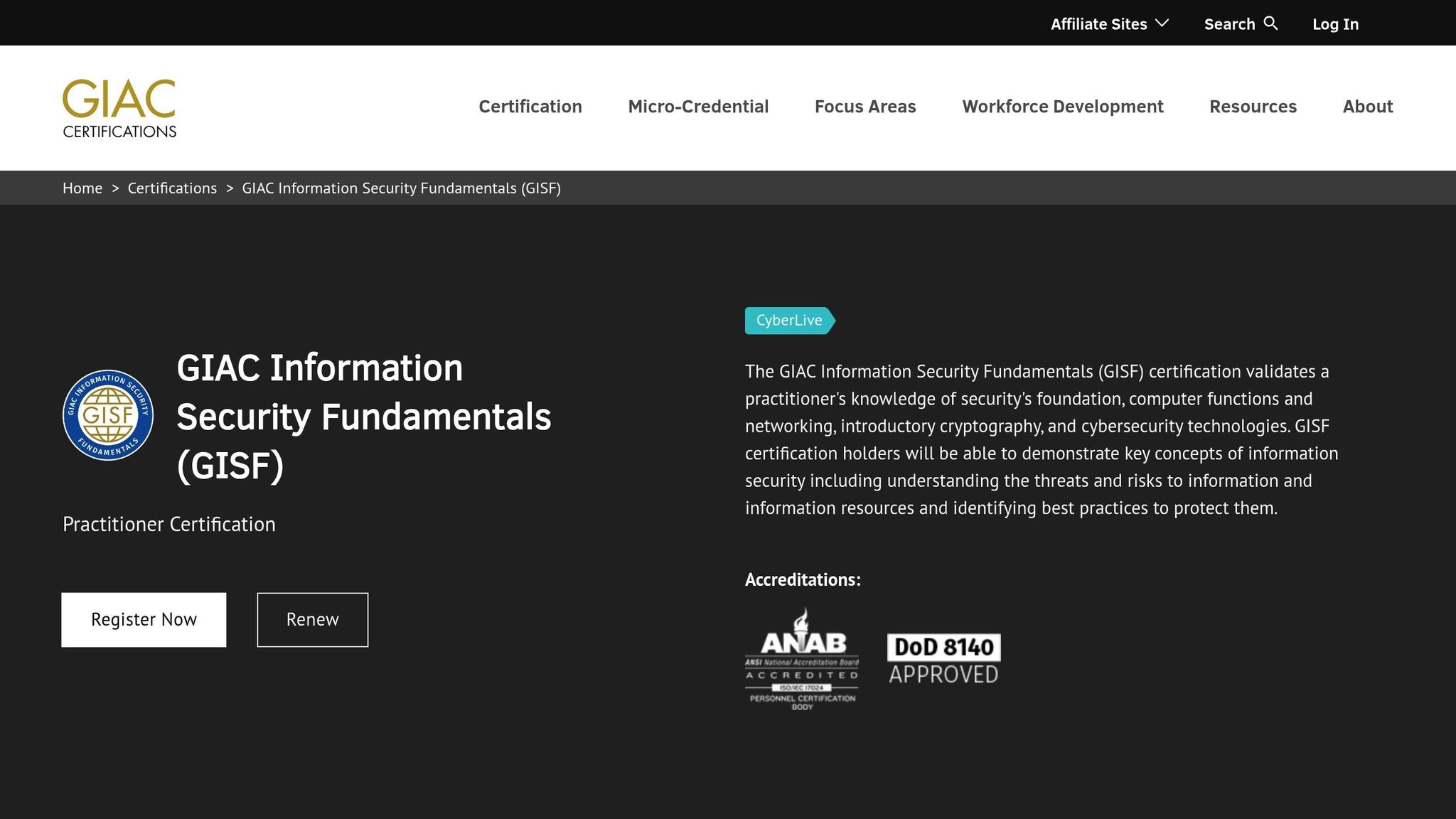
The GIAC Information Security Fundamentals (GISF) certification is tailored for newcomers to cybersecurity. It covers essential concepts like risk management, security policies, incident response basics, and fundamental security controls. Since it’s vendor-neutral, the skills you gain can be applied across different platforms and environments, making it a versatile option for beginners.
Cisco Certified CyberOps Associate
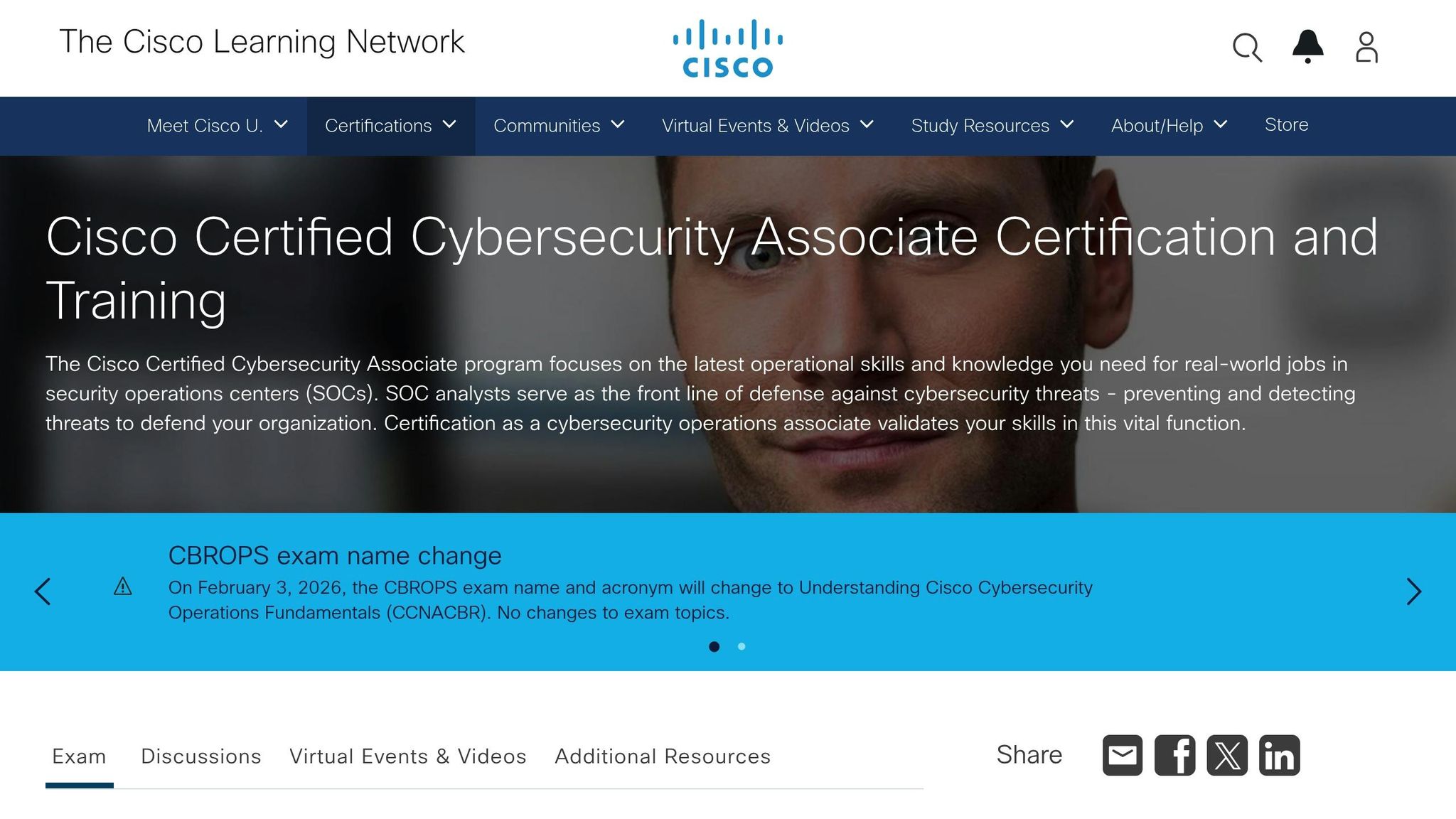
The Cisco Certified CyberOps Associate certification is designed for those interested in working in a Security Operations Center (SOC). It focuses on skills like monitoring networks, analyzing security events, and responding to incidents.
This certification teaches you how to use security monitoring tools, analyze network traffic, and manage incident responses. With 59% of organizations impacted by cybersecurity incidents, demand for SOC professionals is on the rise. Cisco’s global reputation adds value to this certification, making it a great choice for anyone looking to join a security operations team. It also complements foundational certifications by emphasizing operational readiness for SOC roles.
sbb-itb-8a31326
Certification Comparison Guide
Selecting the right certification can feel overwhelming. To simplify your decision, it's essential to weigh factors like costs, prerequisites, exam formats, and career focus. Here's a breakdown to help you align your choice with your career goals.
Side-by-Side Comparison
Below is a table that lays out the key details of popular certifications, making it easier to compare your options.
| Certification | Cost | Prerequisites | Exam Format | Validated Skills | Common Job Roles | Study Time |
|---|---|---|---|---|---|---|
| CompTIA Security+ | $404 exam fee + $50/year renewal (every 3 years) | None | Multiple choice, performance-based | Core cybersecurity concepts, threat management, network security | Systems Administrator, Network Security Specialist, Junior Penetration Tester | 2-4 months |
| Google Cybersecurity Certificate | Varies by platform | None | Project-based coursework | Python, Linux, SQL, SIEM tools, AI integration | Cybersecurity Analyst, SOC Analyst, IT Security Analyst | 3-6 months |
| Certified Ethical Hacker (CEH) | $1,199 (Pearson Vue) or $1,050 (EC-Council) + $80/year renewal | Recommended 2+ years experience | Multiple choice | Penetration testing, vulnerability assessment, ethical hacking methodologies | Penetration Tester, Security Consultant, Ethical Hacker | 3-5 months |
| GIAC Information Security Fundamentals (GISF) | $999 exam fee + $469 renewal (every 4 years) | None | Multiple choice | Security foundations, cryptography, networking basics, incident response | Security Analyst, Compliance Specialist, Risk Analyst | 2-3 months |
| Cisco Certified CyberOps Associate | $300 exam fee | None | Multiple choice, simulation | Security monitoring, incident response, network traffic analysis | SOC Analyst, Security Operations Specialist, Incident Response Analyst | 3-4 months |
Key Takeaways
The cost of certifications varies significantly, so it's worth considering your budget alongside your career goals. For instance, CompTIA Security+ offers broad industry recognition at a reasonable cost of $404, making it a strong option for those starting out. On the other hand, the Google Cybersecurity Certificate emphasizes hands-on skills with tools like Python and Linux, giving you practical experience to launch your career.
If you're aiming for specialized roles, CEH is a standout choice. While it comes with the highest price tag, its focus on penetration testing and ethical hacking can lead to lucrative opportunities. As Farzan Karimi, Engineering Manager for Android Offensive Security at Google, shared:
"CEH was my first confidence booster and helped land me a job on a Red team in the government sector".
The numbers back this up: ethical hackers earned an average salary of $110,757 in 2024, a jump from $103,866 in 2022. Top professionals in the field make over $137,000 annually.
For those seeking a solid foundation, GISF is a great pick. It ties into the SANS SEC301 course, which covers everything from basic terminology to cloud computing. This makes it ideal for beginners who want a thorough understanding of security fundamentals.
Meanwhile, Cisco's CyberOps Associate is an affordable entry point at just $300. It prepares you for Security Operations Center (SOC) roles, which are in high demand across the industry.
Study Time and Budget
Preparation times range from 2 to 6 months, depending on the certification. If you're short on time, CompTIA Security+ and GISF require less study compared to the more intensive CEH and Google Cybersecurity Certificate.
When choosing, think about both your budget and timeline. If funds are tight, Cisco CyberOps Associate or CompTIA Security+ are wallet-friendly options. For a bigger investment, CEH or GISF can fast-track your path to specialized roles. Use this comparison to find the certification that aligns with your career aspirations.
How to Pick the Right Certification
Choosing a cybersecurity certification isn't just about earning a credential - it’s about aligning your goals, budget, and the demands of the job market. With cybersecurity jobs projected to grow by 32% between 2022 and 2032, selecting the right certification can set the foundation for a successful career.
Key Decision Factors
When deciding on a certification, consider the following:
Budget Considerations
Certification costs vary widely, from $99 for Microsoft’s SC-900 to over $1,000 for the CEH. Don’t forget to factor in renewal fees. If you're employed, check if your company is willing to cover these expenses.
Career Goals
Your career path will influence your choice. For instance, the CEH is ideal for penetration testing, while CompTIA Security+ provides a broad, vendor-neutral foundation. If you’re working in a Microsoft-heavy environment, certifications from Microsoft might be a better fit.
Experience Level
Some certifications assume prior knowledge, but there are options for beginners. CompTIA Security+, for example, doesn’t require any prior experience.
Job Market Demand
The demand for certifications can vary by location, but CompTIA Security+ is widely recognized, with nearly 470,000 job openings in the U.S. alone and over 700,000 certified professionals worldwide.
Learning Style
Consider how you learn best. Hands-on learners might prefer programs like the Google Cybersecurity Certificate, while others might benefit from structured study options like CompTIA Security+ or GISF.
Building Your Career Path
Once you’ve chosen a certification, it’s time to think about how it fits into your long-term career plan. Entry-level certifications often act as stepping stones to more specialized roles.
-
Security Operations Center (SOC) Roles:
Certifications like Cisco’s CyberOps Associate prepare you for roles in security monitoring and incident response. -
Compliance and Risk Management:
GISF focuses on foundational security and compliance frameworks, making it a good choice for Compliance Specialist or Risk Analyst positions. -
Penetration Testing:
CEH introduces ethical hacking concepts. Ethical hackers earned an average of $110,757 in 2024, up from $103,866 in 2022. -
Cloud Security:
Microsoft’s SC-900 lays the groundwork for roles in cloud security architecture and management.
Your first certification is a starting point that establishes your credibility. To remain competitive in this ever-changing field, continuous learning is essential.
Getting Help from Root School
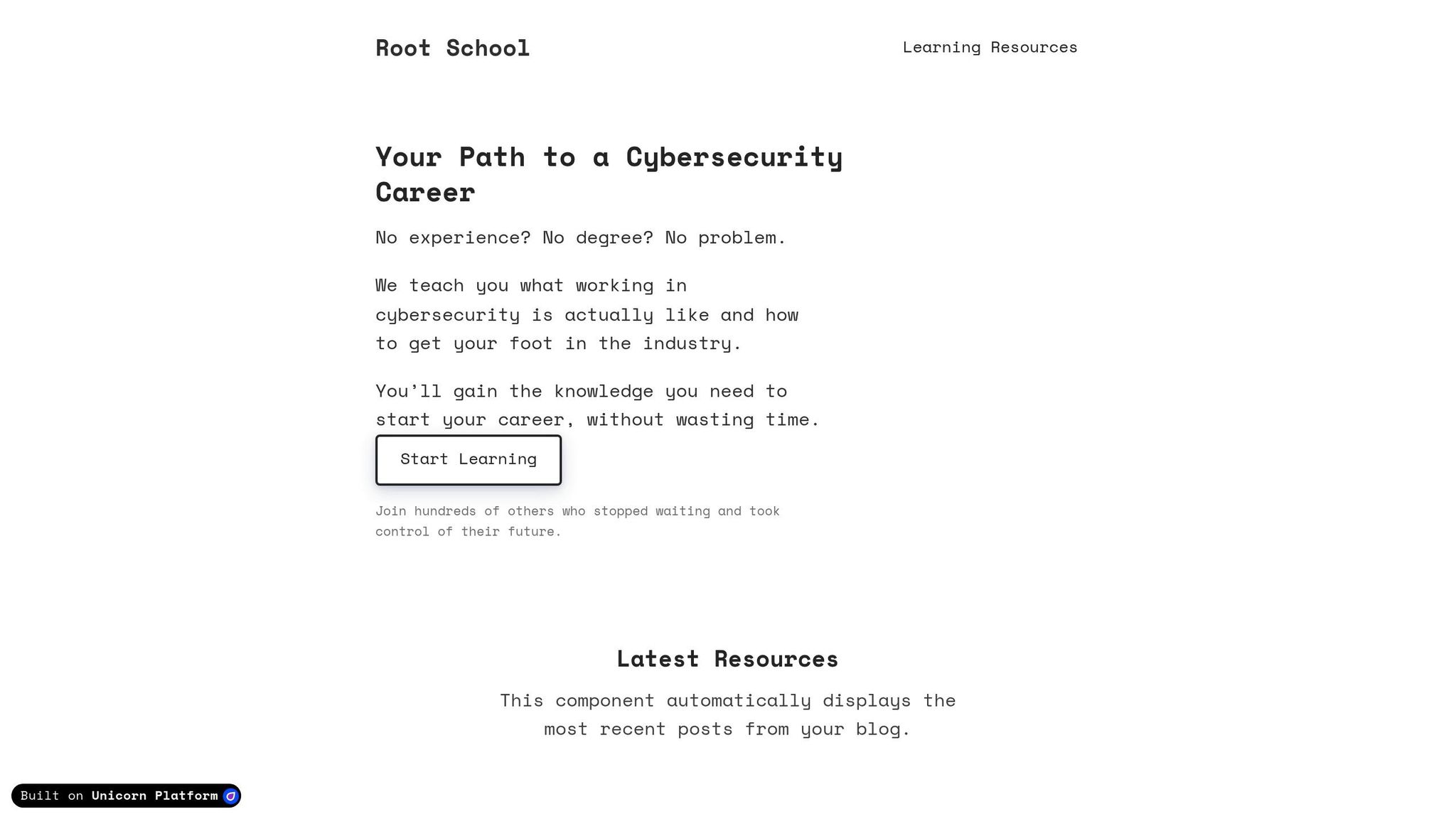
Feeling overwhelmed by the number of options? That’s where Root School comes in. Matching the right certification to your career goals can be challenging, but Root School simplifies the process with practical, targeted advice.
Root School specializes in helping aspiring cybersecurity professionals take their first steps in the industry. Their resources are tailored to align certification choices with the current job market. From selecting certifications to planning study schedules and preparing for interviews, Root School provides the tools needed to bridge the gap between earning your certification and landing your first cybersecurity role.
Conclusion
The cybersecurity field offers incredible potential for career advancement. Certifications can increase salaries by as much as 20%, and with Cybersecurity Ventures predicting 3.5 million unfilled positions globally by 2025, the demand for skilled professionals is undeniable. Meanwhile, the financial impact of cybercrime is projected to hit $10.5 trillion annually by 2025.
"Cybersecurity certifications are crucial in validating skills and enhancing career prospects. They open doors to specialized roles, increase earning potential, and provide job security."
Given these trends, selecting the right certification is key. Whether it’s CompTIA Security+ for a strong foundational understanding, the Google Cybersecurity Certificate for practical, hands-on skills, or CEH for those interested in ethical hacking, your first certification not only builds credibility but also signals your dedication to the field. Each certification we’ve discussed provides a distinct route into various cybersecurity niches.
As the cybersecurity landscape continues to shift with emerging threats and technologies, staying informed is essential. This means keeping up with industry trends, connecting with fellow professionals, and gaining real-world experience. A commitment to ongoing growth will help you stay competitive in this ever-changing industry.
Earning a certification is just the beginning. The real challenge lies in leveraging that knowledge to secure your first role. By aligning your certification with your career ambitions and embracing continuous learning, you’ll be well-prepared to thrive in one of today’s most critical and rewarding career paths.
FAQs
What should I consider when selecting an entry-level cybersecurity certification?
When selecting an entry-level certification in cybersecurity, it’s important to weigh a few critical factors to ensure it supports your career aspirations and fits your circumstances. Start by looking at the connection to your career goals. Certifications like CompTIA Security+ or Certified Ethical Hacker (CEH) are widely respected and can serve as a solid stepping stone into the cybersecurity world.
Next, consider the credibility and employer recognition of the certification. Certifications from established organizations like CompTIA or ISC2 often carry more weight in the job market, making them a safer choice.
You’ll also want to factor in the cost and time commitment. Some certifications require significant financial investment or extensive preparation, so it’s essential to pick one that aligns with your budget and availability. Lastly, choose a certification that matches your current skill set. Beginner-friendly certifications are a great way to build the foundational knowledge needed for more advanced credentials down the line.
How do entry-level cybersecurity certifications affect salaries and job opportunities?
Earning an entry-level cybersecurity certification can open doors to better salaries and more job opportunities. By 2025, roles like Security Operations Center (SOC) Analyst are expected to offer annual salaries between $65,000 and $97,000, with certified professionals often landing at the upper end of that range.
Certifications such as CompTIA Security+ showcase proven skills, making candidates stand out to employers and boosting their earning potential. On top of that, the cybersecurity field is projected to grow by 33% between 2023 and 2033, meaning even more opportunities for those with the right credentials. Securing a well-recognized certification is a smart move for anyone looking to thrive in this fast-growing and rewarding industry.
What are the benefits of earning vendor-neutral certifications like CompTIA Security+ or GISF?
Earning vendor-neutral certifications such as CompTIA Security+ or GISF can be a smart move for anyone looking to break into cybersecurity. These certifications cover the core principles of cybersecurity that are relevant across a variety of platforms and technologies, giving you skills that are flexible and applicable in many different settings.
What’s more, these certifications are highly regarded by employers in the industry. They show that you have a solid foundation of transferable knowledge, which can make you stand out in the job market and potentially lead to a wider range of career paths. For those just starting out in cybersecurity, vendor-neutral certifications are a great way to build credibility and expand opportunities.


